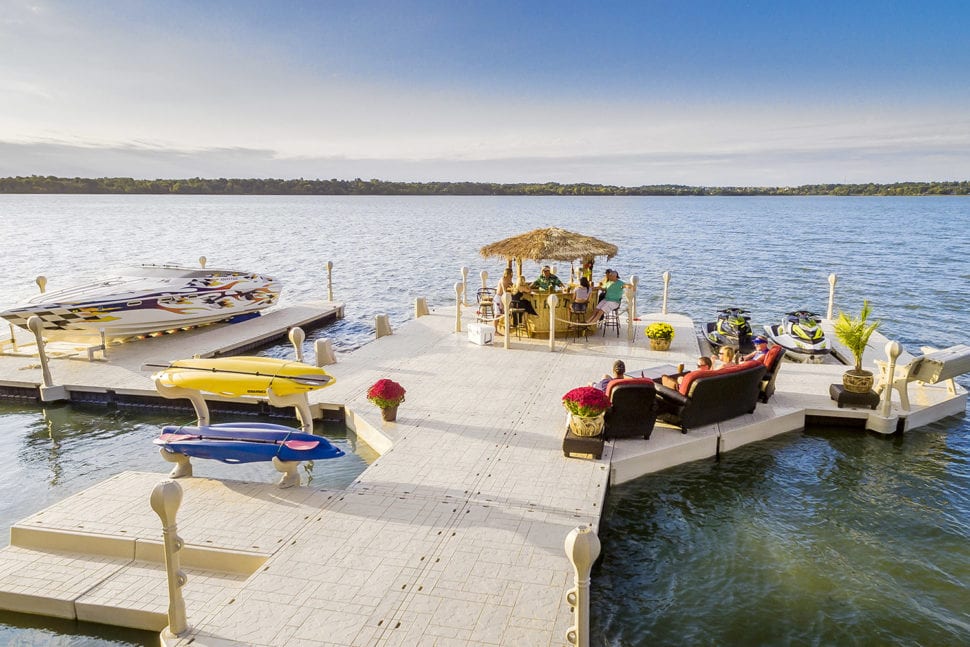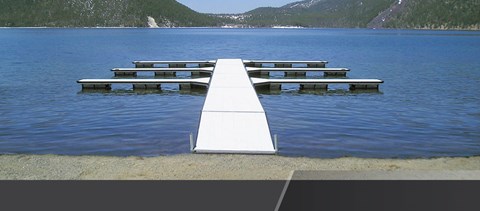Your Overview to Finding the most effective Dock Company for High Quality and Integrity
Floating Docks: The Ideal Selection for Versatile Water Access
Floating docks present an engaging remedy for a selection of water gain access to needs, supplying adaptability that goes beyond traditional mooring options. The modular nature of floating docks assists in modification, providing to specific demands.
Advantages of Floating Docks
Floating docks offer countless advantages that improve water accessibility for numerous applications. Their capacity to drop and rise with transforming water degrees makes them specifically beneficial in atmospheres with varying trends or seasonal variants. This versatility guarantees that vessels can easily anchor without problem for the water's deepness, providing a reliable platform for recreational, industrial, and commercial uses.
In addition, floating docks are frequently constructed from durable materials that stand up to rust, making them appropriate for long-term use in aquatic environments. Their installment is normally less intrusive than standard set docks, reducing the ecological influence and facilitating quicker deployment (floating dock company). This versatility allows for easier relocation or reconfiguration according to customer demands or ecological adjustments
Security is another vital benefit; floating docks can provide stable gain access to for people boarding or getting off from boats and lower the risk of mishaps related to unpredictable surfaces. Furthermore, they can be designed to fit a range of accessories, such as fenders and cleats, improving functionality. On the whole, floating docks stand for an effective option for boosting water access across varied sectors while advertising safety and ecological sustainability.

Kinds Of Floating Docks
Numerous kinds of floating docks satisfy different needs and environments, each developed with details attributes to maximize functionality. One of the most usual kinds consist of modular docks, which contain interlacing areas that enable very easy personalization and development. These docks are optimal for recreational usage, as they can be customized to fit various boat dimensions and water problems.
An additional preferred choice is the fixed floating dock, which stays anchored in position but floats with altering water degrees. floating docks. This type is particularly suited for areas with very little tidal changes, supplying steady access for fishing or swimming. Additionally, there are drive-on docks, which include a sloped design that allows watercrafts to easily drive on and off, making them suitable for personal watercraft and smaller vessels
For business applications, durable floating docks are available, constructed from strengthened products to endure significant lots and extreme aquatic settings. Finally, green floating docks utilize sustainable materials and layouts to lessen environmental effect, often integrating features like plant life to support local wild animals. Understanding the different kinds of floating docks makes certain that customers can choose the most appropriate option for their specific requirements.
Installation Process Overview
A successful installation of floating docks calls for cautious preparation and interest to detail to guarantee optimal performance and safety. The first step includes examining the site conditions, consisting of water depth, present, go and prospective obstacles. This assessment informs the option of the appropriate dock products and style customized to the details setting.
Next, acquiring essential licenses is crucial, as several territories have guidelines relating to building on water bodies. Once authorizations are secured, the setup can proceed. Begin advice by preparing the foundation, which might entail anchoring systems or pilings tailored to the dock type and neighborhood conditions.
Adhering to the structure configuration, put together the dock sections according to supplier specs. Make sure that all components are securely secured and lined up to stand up to ecological anxieties. Placement the dock in the marked location, ensuring it is level and secure.

Maintenance Tips and Ideal Practices
After the installment process is full, recurring maintenance plays a crucial function in making sure the long life and capability of floating docks. Routine inspections ought to be carried out to recognize any signs of wear, wear and tear, or damage - floating docks. Look for any loosened fittings, fractures, or separation in the dock sections, as these can jeopardize structural integrity
Cleaning up the dock is vital to get rid of particles, algae, and click this link various other build-up that can impact its appearance and safety. Use a gentle stress wash periodically to maintain tidiness without causing damages to the surface. Furthermore, using a protective sealer every few years can assist boost long life and withstand environmental wear.
Pay interest to the mooring lines and supports, guaranteeing they are safe and secure and cost-free from corrosion. Change any degraded elements quickly to prevent hazards. Seasonal modifications might additionally be essential; during extreme climate condition, rearranging or strengthening the dock can prevent damage.
Applications for Floating Docks
Floating docks serve a plethora of applications, satisfying both industrial and entertainment demands. In leisure setups, they provide seamless accessibility to waterways for activities such as boating, fishing, and swimming. Their flexible nature permits setup in varying water levels, making sure secure and secure accessibility no matter tidal variations.
Commercially, floating docks are vital for marinas and waterfront companies. They facilitate the docking of vessels, making it possible for reliable loading and discharging of goods. Their modular layout enables very easy expansion or reconfiguration to accommodate altering service needs, making them perfect for boat leasings, trip procedures, or fishing charters.
In addition, floating docks are utilized in environmental applications such as water research study and habitat reconstruction. They can offer as platforms for scientific studies, keeping track of water high quality, or carrying out wildlife surveys without disturbing delicate ecological communities.
In commercial contexts, floating docks are used in building and construction projects, providing access to hard-to-reach areas for equipment and workers. Their flexibility, durability, and marginal impact on the atmosphere make them an ideal option for a vast array of applications, boosting both performance and access in numerous water-based atmospheres.
Conclusion
In conclusion, floating docks represent an optimal remedy for diverse water gain access to needs, owing to their adaptability, resilience, and modular style. Floating docks offer as a valuable possession for entertainment, business, and ecological projects, ensuring reliable accessibility to waterways and advertising sustainable techniques in aquatic environments.
Floating docks present a compelling option for a selection of water accessibility requires, supplying flexibility that transcends traditional mooring options.Floating docks deal numerous advantages that enhance water accessibility for different applications. In general, floating docks stand for an effective solution for improving water gain access to across varied markets while advertising safety and security and ecological sustainability.
An additional popular choice is the stationary floating dock, which stays anchored in place however floats with changing water levels.In verdict, floating docks stand for an ideal option for diverse water access needs, owing to their adaptability, sturdiness, and modular design.